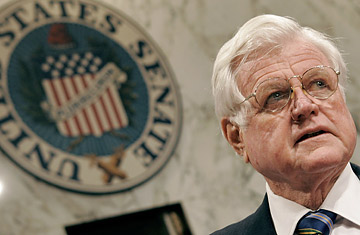
Senator Edward Kennedy attends attends a Senate Armed Services Committee hearing on Capitol Hill in July, 2006
The Saturday morning that Senator Ted Kennedy was rushed to the hospital after having a seizure, I bumped into one of his staffers at the grocery store. Between the candy aisle and the magazines she marveled at her boss's limitless energy. "We were on the floor last week and two weeks before that," she told me, which we both knew is amazing considering how little legislation moves through the closely divided Senate in an election year.
Now that Kennedy has been diagnosed with a malignant brain tumor, no one knows just how quickly he will be returning to the Senate. It will be at least a week before we learn the full extent of his diagnosis and treatment plans, and the senator is holding off making any decisions until then. There are currently no plans for him to resign, or even to take an extended leave of absence.
Already, though, Kennedy's current absence is being felt on Capitol Hill. Votes through the end of the week looked uncertain as Democrats scrambled to tally support on amendments to two key pieces of legislation before the chamber. Every vote will count in the Senate's attempt to override President George W. Bush's veto of the farm bill and on a number of controversial provisions, including a measure to expand education assistance to military veterans, in the emergency war supplemental bill, which primarily provides funding for the wars in Iraq and Afghanistan.
One of those provisions is a move to expand unemployment insurance sponsored by none other than Kennedy. And that's just one of nearly a dozen bills on his plate as chairman of the Senate Health, Education, Labor and Pensions Committee, fondly known as the HELP committee. Other Kennedy bills pending before the committee or the full Senate include bipartisan legislation to modernize medical records; the reauthorization of both the Higher Education Act and No Child Left Behind; mental health parity legislation; a bill to ensure fair pay to women, which was defeated three weeks ago but which Kennedy swore on the floor to bring back; and a bipartisan bill granting collective bargaining rights to emergency first responders, which was on the floor last week and is still awaiting a final vote.
Being short a needed vote is not an unfamiliar position for Senate Majority Leader Harry Reid, who made do without South Dakota Senator Tim Johnson for more than a year after he suffered bleeding in the brain. Still, Kennedy is an unparalleled force in the Senate, an engine for legislation that makes him — if judged by legislative productivity alone — the most important senator this half-century. Kennedy "has never felt that compromise is a dirty word and smart Republicans have recognized that," said Jim Manley, Reid's communications director.
Other senators have battled cancer and remained in office. Pennsylvania Senator Arlen Specter is currently receiving chemotherapy for his second bout with Hodgkin's disease. He not only remained in office during his first rounds of treatment; he was a very active chairman of the Senate Judiciary Committee, shepherding through two Supreme Court judicial nominees.
Still, Hodgkin's cancer is very different from a brain tumor, which has more potential to affect cognitive abilities and decision-making processes. If Kennedy were to eventually consider a leave of absence, Senator Barbara Mikulski of Maryland would likely become acting HELP Committee chairman (Chris Dodd and Tom Harkin are more senior but both have their own committees to run: banking and agriculture, respectively). Anyone who knows Kennedy knows that he lives for his work, his family, his dogs and his boat. And Kennedy recently signed a record publishing deal for his memoirs. For now the Massachusetts senator plans to spend a quiet Memorial Day weekend on the Kennedy compound in Hyannis with his family.
